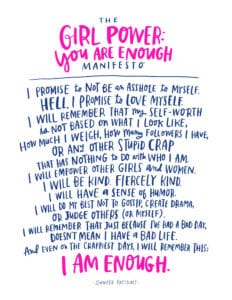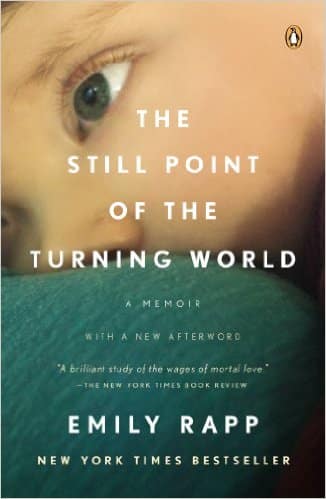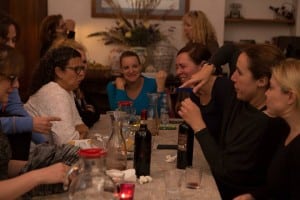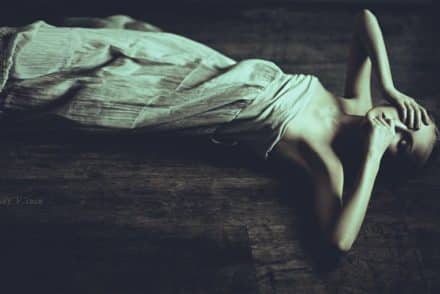By Sami Jankins with Emily Rapp Black
In life I’ve been fortunate to have extraordinary mentors. Mentors who have encouraged me to see my dreams as things that can be realized if I work hard enough. They have all been fantastic role models, however, they have always been men. It wasn’t for a lack of trying on my part, but all of the fields I have delved into have always had a strong male presence. What I have always wanted was to be a part of some glorious lady squad, and not to sometimes be the only woman in the room. In graduate school this would all change.
Once I received acceptance into the University of California-Riverside at Palm Desert’s low residency MFA program, I may have mentally willed Emily Rapp Black to be my professor. We happen to have strange life similarities. Besides both being gingers, we also both have a disability and have been posterchildren because of our disabilities. I knew that she would understand the kind of essays I wanted to write because she had probably been in similar life scenarios, ones that many others wouldn’t possibly understand. I immediately read through both of her memoirs – Poster Child and The Still Point of the Turning World. Even when I was in the emergency room with a severe migraine, I switched the book to audiobook as I had to keep listening about how fiercely she worked towards providing Ronan, her son who passed away from Tay-Sachs, with a beautiful life.
Suddenly I understood how someone could read a memoir by an author and automatically feel they knew them. Not only is she strikingly beautiful, but she’s whip smart with a wry sense of humor. She also unabashedly believes in her students and provides support during this dizzying writing process, even if it’s just to send a quick message checking in. She goes above and beyond with everything she does, and at the heart of everything, is authentic. There is something captivating about her willingness to be so open and raw that it encourages her students to put forward the same kind of rawness in their work. Most students in a low residency program switch professors, and yet I’ve decided to stay with Emily the entire time as her input has helped shape the writer I’ve become and continue to evolve into. It’s her unique approach that has helped me to see that my writing isn’t merely “disabled lit”, but a narrative greater than that which has brought me to where I am today. I’m lucky to have Emily as my mentor. This past winter I interviewed Emily about how she got her start in writing and why she feels it’s important to actively encourage the next generation of writers.
Sami Jankins: First, what got you into writing?
Emily Rapp Black: I suppose I really liked to read. My mom has this joke that whenever the chores needed to be done, she could pretty much count on the fact that I would be in the bathroom with the door locked, sitting on the radiator reading instead of cleaning. That was really fueled by a childhood insomnia that lasted for three or four years. I read books into the night. Mostly Laura Ingalls Wilder. That’s kind of how I got interested in writing, but I never considered myself a writer. I was very obsessed with words. I used to go into my closet and write poems about colors, and I suppose that’s a very early interest. Then when I went to school, especially in college, I was a religion major and I would get comments on my papers from professors that they weren’t the traditional academic paper although they were getting good grades. I was constantly trying to make them more creative which the professors appreciated, but they were like “and now you have to write the straight up analytical paper.” I ended up writing a lot of double assignments. It was great. A lot of practice. Then I took a creative writing class which at the time was mid-90’s. It was an elective.
I went to Ireland as a Junior in college before Ireland entered the European Union. It was still a very poor country, not very diverse, and that was a hugely influential moment in my life. It made me look into my life and experiences in a more story-like way. I could see that the stories from the place I was from in beautiful, rural Wyoming had value to them. Those places were fraught with things like tension and sex. It wasn’t just a city. I guess that kind of piqued my interest. Then I went to divinity school and I realized I couldn’t do the religion thing. I didn’t want to be a religion professor. I had to lobby to get into a creative writing class and then that was it. That’s when I decided I would finish up there and go on to get an MFA.
Sami Jankins: When I was accepted into the UCR program and selected nonfiction as my cross-genre, I intuitively knew that I would be given you as a professor. Based on reading your memoirs…
Emily Rapp Black: Yeah, the body stuff!
Sami Jankins: As well as the bizarre connection that we were both posterchildren. Because how many people have had that experience? What pulled you to the nonfiction aspect of writing, and being willing to talk about what you do? Do you think having the background as a posterchild and being put out there as an example…
Emily Rapp Black: Like the pageantry of it?
Sami Jankins: Sure, exactly. Did that affect what you set out to write?
Emily Rapp Black: Absolutely. I didn’t actually write nonfiction about disability or body intentionally until I went to graduate school when I was twenty-seven. I was hugely afraid of talking about it so I wrote bad fiction stories about it. They were just hideous. Just terrible. I couldn’t figure out why it wasn’t translating, and it was because I needed to tell it in nonfiction. I didn’t really know what that was. I took a class with Laura Firmin and she was responsible for getting out of me the essay that became the first book. It was very liberating. I was nervous during my first workshops, but I was very nervous all of the time about workshopping. I wasn’t worried about people finding out about me, weirdly. I think that has to do with when you have a disability, people don’t assume you have any sense of privacy anyway. You are used to being looked at. You are used to being poked and prodded. People have been asking me stupid questions in elevators since I can remember. I didn’t have any expectation of privacy. That part of nonfiction does not bother me. I always feel to some degree or another on the stage or underneath a spotlight. Whether or not that’s acute or benign, it’s something that I have trouble losing because I think it’s sometimes so true. Not like a happy spotlight of “oh, you’re awesome.” More like people trying to figure out what exactly is going on.
I like nonfiction. It’s easier for me than fiction partly because I’ve been doing it now for ten years, partly because it suits my utter lack of self-consciousness now. I wouldn’t want to reenact it, but writing about it… I just don’t care.
Sami Jankins: This is something I’ve discussed with my fellow peers. After being in your class, I feel like there’s something about your age demographic of nonfiction women writers that project this inherent girl power and are all about mentoring the next generation. I feel very supported within the community which is awesome. Where do you think that mentoring stems from? Did it come from a lack of that type of community  empowerment previously, and a void is now consciously being filled? Is this a continued effort to cultivate potential in the next generation?
empowerment previously, and a void is now consciously being filled? Is this a continued effort to cultivate potential in the next generation?
Emily Rapp Black: I don’t think it was a deliberate strategy. I definitely think it’s linked to Jen’s efforts with Girl Power: You Are Enough! I can’t remember a time in my life when girlfriends weren’t my major support group. My family, my girlfriends, and then partners that shifted in and out of life were my support. That to me has always been an innate desire to create a group of women. Partly because I feel more comfortable around women. I think it’s great to contradict the typical story about women that people like to tell – that we’re all bitchy and backstabbing. Now it has become a goal of mine. I want people to feel supported in their writing and in the community. I don’t want people feeling ashamed of what they write or what their skill level is. Writing is a craft. It can be taught. Not everyone is going to rise to the top. There’s different levels of ability and talent in every group, but everyone has something to offer. I definitely believe that. My goal has been to cultivate a work ethic in people that transcends any grappling for “top spot” because there is no top spot.
Sami Jankins: What do you get out of teaching?
Emily Rapp Black: Seeing writers like you grow and suss things out. I like teaching because it fun, energetic, and interesting. It’s a steady job that gets me out of the house. It gets me interacting with people and sharing the love of words. It has taught me so many things and brought to me so many things. It’s a nice complement to a writer’s life.
Sami Jankins: What advice would you have to give a young writer?
Emily Rapp Black: I would say read a lot. Take every opportunity to learn from writers – famous or not. Take every opportunity to be published on any platform that wants you unless it’s some kind of sketchy website. Ask questions. Finally, work hard. A lot of people have innate talent, are really smart, and that’s great. In the end, everyone has to revise. If you’re used to not having to do that or are not committed to the sort of “nuts and bolts” work – the chop wood and carry water, the isolating feeling unless you’re writing collaboratively – then you should find something else to do. You have to gird your loins for the long haul and also have a long view. This is hard to do.
In my late twenties when I was really obsessed with who was winning what award and how was I going to get to the top, my friend Tara Ison used to say “a thoroughbred runs her own race. You just do your own thing. Be happy for other people. Do your best and the rest of it has nothing to do with art. Everything has to do with chaos, chance, luck, and the capricious nature of the literary world.” She’s absolutely right. Don’t do it for the affirmation. Don’t do it for the gratification. Do it for the love of the work, and the feeling of putting something beautiful in the world that no one else could do in quite the same way you just did it. Even if two people read it, that’s enough. That’s the goal, not notoriety.
 Sami Jankins, is a MFA student in Screenwriting at UC-Riverside at Palm Desert and dating advice columnist for The Good Men Project’s upcoming weekly column – Dating in the Digital Age with Sami Jankins. She currently writes a blog called Chronicles of Cheerful Clotter for HemAware Magazine, where she details her life with chronic health conditions. Sami is also a co-producer for the documentary Invisible: The Film, that focuses on individuals living with chronic pain and invisible illness. She has served on the Board of Directors for the National Hemophilia Foundation, spent time as a Senatorial intern, and was Miss Wisconsin for the ANTSO program. In addition, she has had articles published in The Manifest Station, I.G. Living Magazine, Ravishly, The Glow (Australia), and Elephant Journal. Her interests include ukuleles and sloths.
Sami Jankins, is a MFA student in Screenwriting at UC-Riverside at Palm Desert and dating advice columnist for The Good Men Project’s upcoming weekly column – Dating in the Digital Age with Sami Jankins. She currently writes a blog called Chronicles of Cheerful Clotter for HemAware Magazine, where she details her life with chronic health conditions. Sami is also a co-producer for the documentary Invisible: The Film, that focuses on individuals living with chronic pain and invisible illness. She has served on the Board of Directors for the National Hemophilia Foundation, spent time as a Senatorial intern, and was Miss Wisconsin for the ANTSO program. In addition, she has had articles published in The Manifest Station, I.G. Living Magazine, Ravishly, The Glow (Australia), and Elephant Journal. Her interests include ukuleles and sloths.
 Emily Rapp Black is the author of Poster Child: A Memoir, and The Still Point of the Turning World, which was a New York Times bestseller. Her work has appeared in VOGUE, the New York Times, O the Oprah Magazine, Salon, Slate, and many other publications. She is Assistant Professor of Creative Writing at the University of California-Riverside. She lives in Palm Springs.
Emily Rapp Black is the author of Poster Child: A Memoir, and The Still Point of the Turning World, which was a New York Times bestseller. Her work has appeared in VOGUE, the New York Times, O the Oprah Magazine, Salon, Slate, and many other publications. She is Assistant Professor of Creative Writing at the University of California-Riverside. She lives in Palm Springs.







2 Comments
[…] wasn’t worried about people finding out about me, weirdly. I think that has to do with when you have a disability, people don’t assume you have any sense of privacy anyway. You are used…. I didn’t have any expectation of privacy. That part of nonfiction does not bother me. I always […]
Thank you for sharing! My daughter suffers from severe epilepsy. I’ve just ordered this book and already can relate so much.